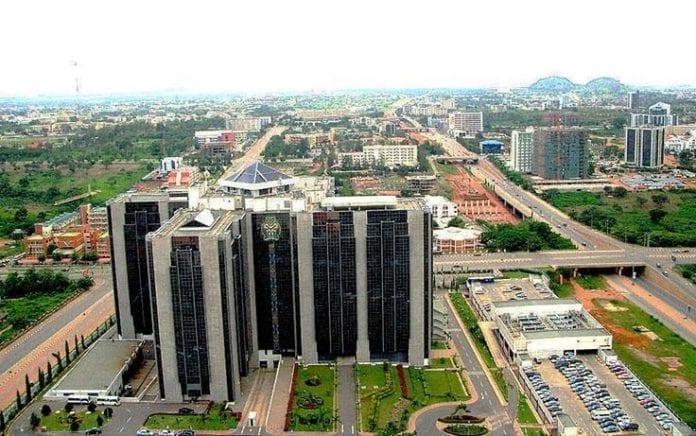The banking sector has availed credit facilities amounting to ₦1.80 trillion, $1.3bn and €10.92 million to 273,435 large companies, individuals and Micro Small and Medium Enterprises (MSMEs) registered under the National Collateral Registry (NCR).
The statement was credited to the Governor of the Central Bank of Nigeria (CBN), Mr. Godwin Emefiele.
He said the figures which were generated from a total of 113,153 financing statements registered on the registry in respect of movable assets offered as collateral, comprised of 262,904 individuals; 1,421 large firms; 4,260 medium firms,; 1,433 micro-businesses and 3,417 small businesses.
This is as the Chief Justice of Nigeria (CJN), Justice Ibrahim Tanko Muhammad, promised that the judiciary would ensure quick dispensation of justice in commercial or business transactions, adding that the financial sector and the overall economy will benefit from such timely adjudication.
Speaking at the opening of a specialised two-day virtual workshop for judicial officers on “Secured Transactions in Movable Asset and Credit Reporting Reforms in Nigeria”, Emefiele pointed out that as at September 30, a total of 694 financial institutions comprising 22 Deposit Money Banks, four Merchant Banks, five Development Finance Institutions, 580 Microfinance Banks, 37 Non-Bank Financial Institutions, 43 Finance Companies, one Primary Mortgage Banks (PMBs) and two Non-Interest Financial Institutions had registered on the NCR portal- the first step towards buy-in to the registry’s operations.
He said some components of the foreign currency-denominated loans represented the much-needed capital inflows into the economy and attests to the power of the registry as well as the Secured Transactions in Movable Assets Act (STMA)- centric reforms by the apex bank, to engender economic development.
Represented by CBN Director, Development Finance Department, Mr. Yila Yusuf, Emefiele, seeking to provide safeguards to credit disbursements under the programme, therefore, stressed the need to sensitise judicial officers, as enablers in the implementation of both the STMA and Credit Reporting Act (CRA, 2017), with a view to strengthening adjudication over them.
He said: “A lending relationship is based on trust and it is our belief that lenders will respond positively to the yearnings of MSMEs for greater access to finance, given the assurance that their legitimate interests would be protected under the enabling laws of the land.
“To this end, it is pertinent that we solicit, and get, the full support of the judiciary and law enforcement agencies towards providing a robust and resilient financial infrastructure that will deepen credit delivery to our MSMEs.”
The CBN governor said the collaboration with the judiciary would help scale the hurdles to significantly de-risk lending to the highly productive MSMEs sub-sector.
He said: “Let me assure you that, in general, we will pull out all the stops to enhance the safety, soundness and resilience of the financial system. Expect us to call on you more often as we continue stakeholder engagements leveraging all available media.
All Nigerians must enjoy the benefits of all reforms initiated in the financial system.”
However, the CJN, who addressed participants via web conference, further maintained that the importance of the judiciary to the financial sector could not be over-emphasised.
He explained that potential investors often hinged their decisions to invest in the country on the enforceability of their rights in any commercial venture, adding that courts must be well abreast of principles guiding credit transactions, especially with the passage of the STMA Act 2017.
As a result, the CJN posited that the judiciary must be empowered to help the financial sector protect credit transactions.
He said: “As the access to credit is necessary for the economic development of Nigeria, it behoves the judiciary to protect parties to a transaction and ensure fair and ethical standards.
“The purpose of both laws is to facilitate and promote access to credit and enhance risk management in credit transactions.
The protection of the rights of parties in a credit transaction would promote responsibility in the market and encourage responsible borrowing.”
He said the judiciary has a crucial role to play in securing transactions in movable assets and credit reporting adding that, “It is, therefore, our collective duty to ensure that the potential and prospects of credit delivery are optimally realised.
The on-going economic development strategy requires the joint efforts of the central bank, the judiciary, and all stakeholders to make giant strides.”
Also speaking at the occasion, World Bank Country Director for Nigeria, Mr. Shubham Chaudhuri said the banks required confidence and assurance of the judiciary to recover their assets.
He insisted that the only way to unlock the much-needed finances for MSMEs was through the noble initiative of the CBN to accept movable assets as collateral for credit, without which finance will be limited for small businesses.

























